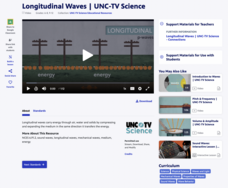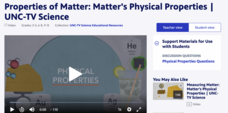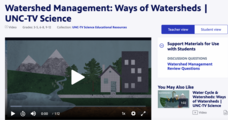Bonneville
Renewable Energy Panel
Plan a panel on public policy. On the first day of lessons, scholars identify local government planners and create questions to ask regarding renewable energy and infrastructure. On the second day, they conduct the panel and learn about...
Bonneville
Home Energy Audit
Reduce energy consumption and save some money at the same time! The third of seven installments in the A Community Powered by Renewable Energy unit focuses on energy use in the home. Learners investigate the energy needs of small and...
Bonneville
What is Electricity and How Do We Use It?
Use some electrifying lessons to learn about electricity. Future scientists discover the history of electricity and the basics of electric circuits. They learn how to read an electricity bill and then create circuits to power a fan,...
Bonneville
Why Use Renewable Energy?
Renew one's interest in renewable energy sources. Scholars learn about the advantages and disadvantages of various renewable and non-renewable energy sources. They conduct an activity to simulate the greenhouse effect and take part in a...
PBS
Longitudinal Waves | UNC-TV Science
Discover whether sound travels in space and other fascinating science facts. Scientists explore energy transfer by longitudinal waves and learn about compression, rarefaction, amplitude, and wavelength while watching an animated video....
PBS
Thermal Radiation: Heat Transfer | UNC-TV Science
What do people, campfires, and microwaves have in common? Investigators explore heat transfer by thermal radiation, discover the role of electromagnetic waves, and see examples of radiation while viewing a video. Scholars challenge their...
PBS
Convection: Heat Transfer | UNC-TV Science
Learn why what goes up must come down in both air and liquids. Investigators discover how convection transfers thermal energy and the movement of particles in liquids and gases due to density differences by viewing an animated video....
PBS
Thermal Energy 101: Heat Transfer | UNC-TV Science
Discover what makes a cup of tea feel hot one minute and cold the next. Young physicists learn about thermal energy, why substances feel hot or cold, and the three means of thermal energy transfer: conduction, convection, and radiation...
PBS
Water Cycle and Watersheds: Ways of Watersheds | UNC-TV Science
Take a field trip with water as it moves on and below Earth's surface. Investigators discover the link between water and land in the water cycle and the importance of watersheds while viewing an animated video. Scholars test their...
PBS
Properties of Matter: Matter's Physical Properties | UNC-TV Science
Does gold really boil? Learn what temperature gold boils at and more using an animated activity about the properties of matter. Scientists learn about the properties of matter including examples of physical properties, the effect changes...
PBS
Phase Changes | Phases of Matter | UNC-TV Science
Take an energetic ride through the phase changes of a water molecule in a compact activity. Young scientists learn about the phases of matter and discover the role of thermal energy in governing phase changes while watching a short...
PBS
The 3 Phases | Phases of Matter | UNC-TV Science
Explore the states of matter without the mess or expensive equipment in a compact, informative activity. Scientists watch as the narrator explains the three states of matter using a glass of ice and soda in an animated video that...
PBS
Watershed Management: Ways of Watersheds | UNC-TV Science
Inspire young conservationists to protect the environment with a short activity on water quality and watersheds. Participants discover the importance of watershed management, learn about water quality problems, and discover possible...
PBS
The Water Cycle: Ways of Watersheds | UNC-TV
Explore water on Earth without getting wet using a short animated activity. Scientists learn how water interacts with the land, the importance of watersheds, and relevant vocabulary as they watch an informative and engaging video....
American Museum of Natural History
Beyond Planet Earth
Scholars take a journey through space with 16 eye-catching images. Along the way, learners read captions starting with the moon, then move onto asteroids, Mars, and Jupiter.
American Museum of Natural History
Journey to the Stars
Fifteen detailed pictures and informative captions delve deep into the exploration of stars—their life cycle and importance in the universe.
American Museum of Natural History
Make Your Own Marine Biology Stationary
Encourage letter writing with marine biology-themed stationary. Three versions showcase a variety of underwater creatures.
American Museum of Natural History
What Do You Know About the Human Microbiome?
Scholars answer 10 multiple choice questions to test their knowledge about the human body and microbes. Correct answers come with a rewarding tone and brief description.
American Museum of Natural History
Bacteria in the Cafeteria
Scholars examine an animated picture to locate stars that, when chosen, provide a brief scenario, question, and answer. With each answer, a letter appears that later reveals a word.
American Museum of Natural History
Microbes Coloring Book and Scavenger Hunt
Coloring pages showcase microbes—bacteria, viruses, and protists. Scholars have the option to download a coloring book and scavenger hunt or color the page directly on the computer. Three paragraphs describe each microbe.
American Museum of Natural History
Are YOU Cut Out for Mars?
A brief, 6-question quiz identifies whether or not a scholar is ready for a mission to Mars.
American Museum of Natural History
A Kid's Guide to Stargazing
Get kids interested in stargazing with a step-by-step guide. The guide begins with the do's and don'ts, what the defines a star, and introduces a journal. The page is linked to see stars if light pollution keeps stars away in your area.
American Museum of Natural History
Being an Astronomer: Neil deGrasse Tyson
An interview delves deep into the life of famous astronomer Neil deGrasse Tyson.
American Museum of Natural History
Cosmic Cookies
Scholars read about each planet then bake a plate of cosmic cookies—no-bake cookies decorated to look like the planets; Mercury, Venus, Earth, Mars, Jupiter, Saturn, Uranus, Neptune, and Pluto.

























